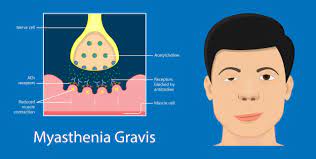Myasthenia Gravis (MG) is a rare neuromuscular disorder that can significantly impact a person’s quality of life. Understanding its symptoms and exploring effective treatment options, such as the innovative Biologic Infusion Therapy, is crucial for those navigating the challenges of MG.
Generally speaking, myasthenia gravis has no effect on life expectancy. However, some serious side effects, such as respiratory failure, might be fatal, especially in the early stages of the illness.
An uncommon autoimmune neuromuscular condition called myasthenia gravis (MG) disrupts the connections between your muscles and neurons. It frequently interferes with daily tasks by causing severe exhaustion and weakness in specific voluntary muscle movements throughout your body. In this blog, you will get to know about the myasthenia gravis and how it progresses. So, let’s continue:
Decoding Myasthenia Gravis Symptoms
Myasthenia Gravis symptoms can vary widely, affecting different individuals in distinct ways. From muscle weakness to difficulty swallowing and breathing, this section will delve into the diverse manifestations of MG, providing readers with a comprehensive understanding of the condition’s symptoms.
Managing Myasthenia Gravis involves a tailored approach, considering the unique characteristics of each case. This section will explore conventional treatments, including medications and surgery, shedding light on the pros and cons of each.
Additionally, emerging therapies such as biologic infusion therapy and their promise to enhance MG management will be discussed.
Revolutionizing MG Treatment with Biologic Infusion Therapy
Biologic Infusion Therapy is making waves in the field of Myasthenia Gravis treatment. This section will spotlight this groundbreaking approach, explaining its mechanism, benefits, and potential impact on patients’ lives. Readers will gain insights into how Biologic Infusion Therapy is reshaping the landscape of MG treatment and offering new hope to those affected.
As we unravel the complexities of Myasthenia Gravis, it becomes evident that a holistic understanding of symptoms and treatment options is crucial. With the advent of innovative solutions like Biologic Infusion Therapy, there’s newfound optimism for individuals grappling with MG. Stay informed, stay empowered, and explore the possibilities that could redefine the journey of living with Myasthenia Gravis.
Biological Infusion Therapy Revolutionized the Treatment for Myasthenia Gravis
The landscape of medical research and treatments has evolved, and advancements may have occurred since then. Therefore, I’ll provide a general overview of how biological infusion therapy, in various forms, has the potential to revolutionize the treatment of autoimmune conditions like Myasthenia Gravis:
Targeted Immunomodulation:
Biologics are designed to target specific components of the immune system. In the case of MG, where the immune system mistakenly attacks the neuromuscular junction, biologics can modulate the immune response more precisely than traditional immunosuppressive medications. This targeted approach may lead to better efficacy and fewer side effects.
Reduced Side Effects:
Biologics are engineered proteins that can be more selective in their actions compared to traditional systemic immunosuppressants. This selectivity may result in a reduced risk of widespread immunosuppression and associated side effects, offering a more favorable risk-benefit profile for patients.
Improved Quality of Life:
By specifically targeting the underlying mechanisms of MG, biologic infusion therapy has the potential to alleviate symptoms and improve the quality of life for individuals with MG. This may include reducing muscle weakness, fatigue, and other symptoms associated with the condition.
Personalized Treatment Approach:
Biologic therapies can be tailored to target specific pathways involved in MG, allowing for a more personalized treatment approach. This tailoring may enhance treatment outcomes, as the therapy can be adapted based on individual responses and disease characteristics.
Potential for Disease Modification:
Some biologics aim not only to manage symptoms but also to modify the course of the disease. By targeting specific pathways responsible for the autoimmune response in MG, biologics may have disease-modifying effects, potentially slowing or halting the progression of the condition.
Clinical Trials and Research:
Ongoing clinical trials and research studies are crucial in evaluating the efficacy and safety of biologic therapies for MG. As more data becomes available, the understanding of how these therapies work and their impact on MG treatment will continue to evolve.
It’s essential to consult with healthcare professionals and stay updated on the latest research findings and treatment guidelines to get the most accurate and current information on the use of biological infusion therapy for Myasthenia Gravis.
Life Expectancy
Your ability to move your muscles voluntarily for daily tasks may be impacted by MG. However, the majority of individuals with MG have a normal life expectancy, and the disease is not fatal in and of itself.
Rarely could MG pose a hazard to life. This is typically brought on by severe MG that has respiratory system effects.
How does myasthenia gravis progress?
Acute MG can strike suddenly. Because of this, an MG diagnosis might not be made until the illness has advanced.
Medical professionals categorize MG as generalized or ocular. The symptoms of ocular MG start in the eyes. It results in weakening in the muscles and tissues surrounding your eyes, which can cause drooping of the eyelids and vision issues.
Symptoms of generalized MG include problems with your eyes and other body muscles. It could impact your head, respiratory system, arms, and legs.
Generalized MG could lead to difficulties in the following ways:
- Swallowing
- Speaking
- Eating
- Sitting up
- Holding up your head
- Climbing stairs
- Walking
- Breathing
- Griping and holding objects
Potential Complications of Myasthenia Gravis
You can lead an active life with MG if you receive therapy. However, it’s crucial to talk to a doctor about any potential disease consequences.
MG-related respiratory failure, commonly known as a myasthenic crisis- is one possible issue. This is a medical emergency that affects your breathing. If breathing becomes difficult for you or a loved one and you have MG, get emergency medical attention immediately.
Myasthenic crises can strike up to 1 in 5 MG patients at some point in their lives. However, they typically happen in the first two years of the illness.
It’s crucial to take into account any potential negative effects of MG therapies. Particularly well-known for their adverse effects are immunosuppressants, which can include:
- Abdominal pain
- Sores
- Vomiting
- Kidney damage
- Nausea
- Fatigue
- Infections
- Liver toxicity
Fuse Infusion is here to Help You with Myasthenia Gravis.
Myasthenia Gravis is an uncommon yet severe autoimmune condition that can impair your quality of life and daily activities.
Treatments can lessen the immune system’s reactivity, which is a factor in MG. In general, the life expectancy of those with MG is equal to that of those without it.
The symptoms of MG are probably underdiagnosed since they fluctuate. Consult a physician if you think you or a loved one could have MG or if autoimmune illnesses run in your family. The prognosis for MG will be better overall the earlier you start treatment.
At Fuse Infusion, we’re committed to providing our patients with top-notch care. Thus, get in touch with us right now to start a biologic infusion therapy!

